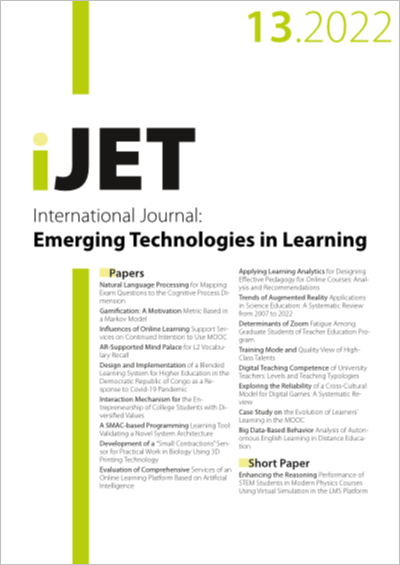Design and Implementation of a Blended Learning System for Higher Education in the Democratic Republic of Congo as a Response to Covid-19 Pandemic
DOI:
https://doi.org/10.3991/ijet.v17i13.30185Keywords:
Covid-19, e-learning, blended learning, blended didactic model, face to face teaching , ICTAbstract
Until now, the higher education system in the Democratic Republic of Congo has relied on the traditional face-to-face teaching method, which consists in the real physical presence of students and teachers during classes and lectures. Thus, the United Nations Educational, Scientific and Cultural Organization (UNESCO) is currently advocating e-learning as the only alternative for education in the COVID-19 era. It goes without saying that this requires specific frameworks and appropriate resources, including access to a good quality internet connection. Several countries around the world have implemented this recommendation since the first quarter of 2020 to protect their populations from the significant risks of Covid-19 contamination. In educational environment however, given the disadvantageous realities of the Democratic Republic of Congo, including the cost and quality of internet, the low rate of electrification, and the lack of experience of the educational stakeholders involved, the migration to e- learning remains a challenge. Thus, we propose in this paper a blended learning model that can smoothly introduce e-learning through a platform specially designed to integrate with the traditional way of delivering courses in Congolese higher education by combining the old method and e-learning based on ICT.
Downloads
Published
How to Cite
Issue
Section
License
Copyright (c) 2022 vogel kiketa, Ms.Hattie Kashoba, Dr.Selain Kabunga, Mr.Pavodi Ndoyi Maniamfu , David Kutangila , Mr.Sllife Nyazabe, Mr. Jeans-Jacques Katshitshi, Dr.Buhendwa Frank

This work is licensed under a Creative Commons Attribution 4.0 International License.



